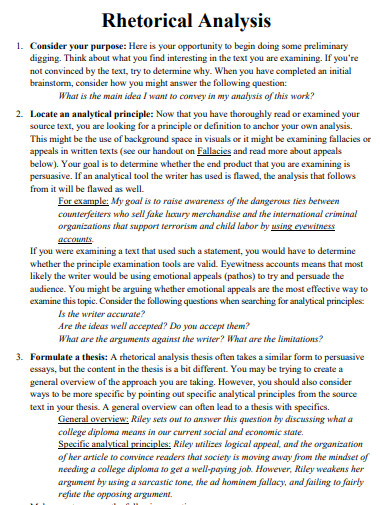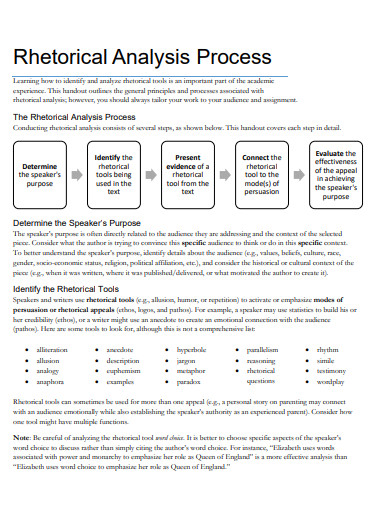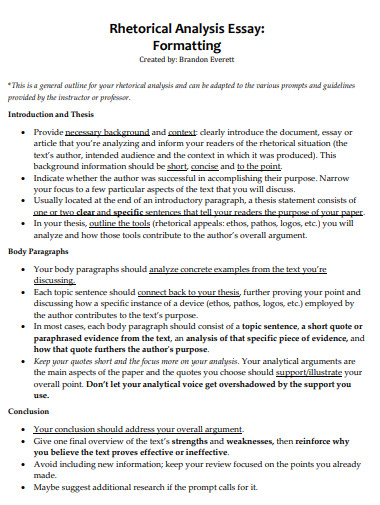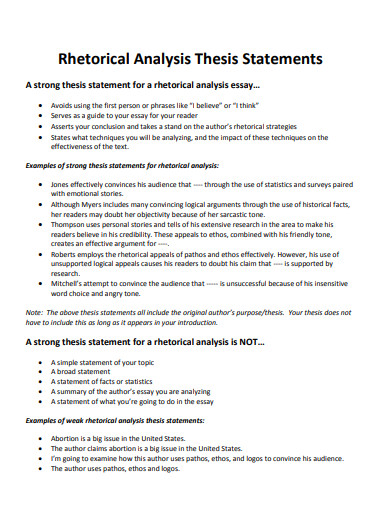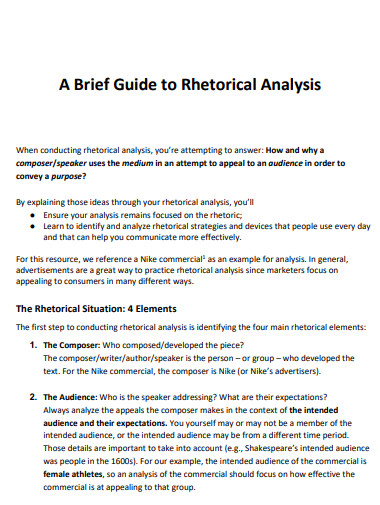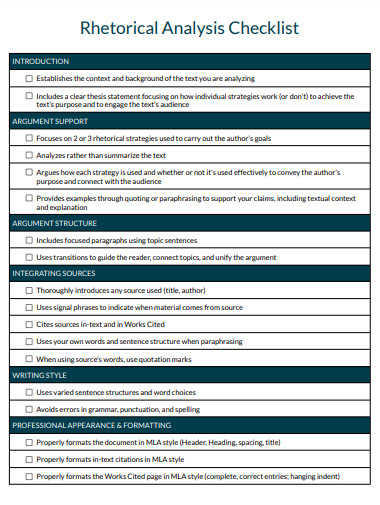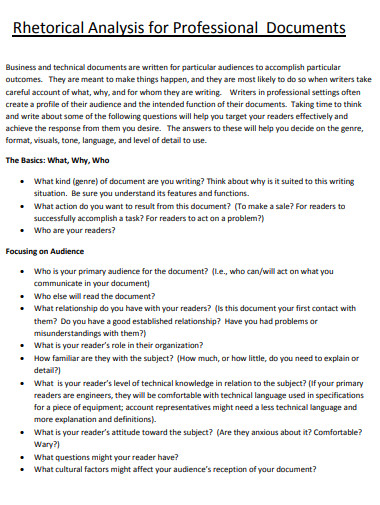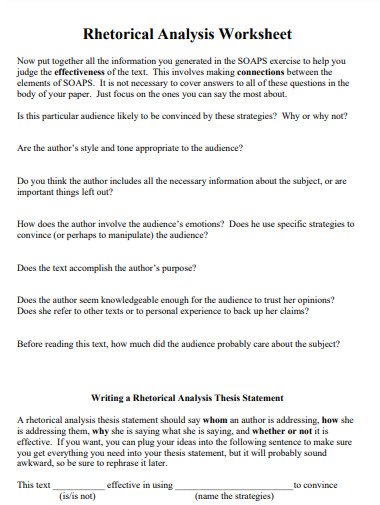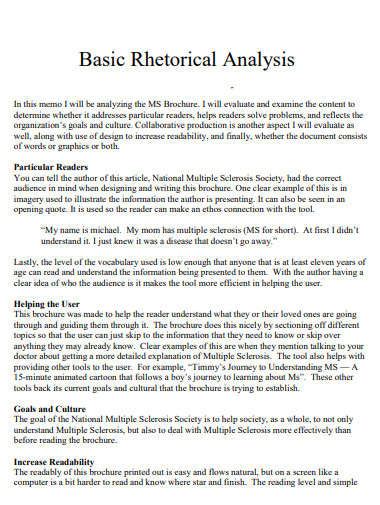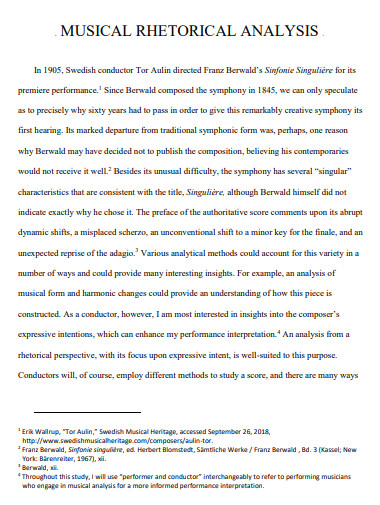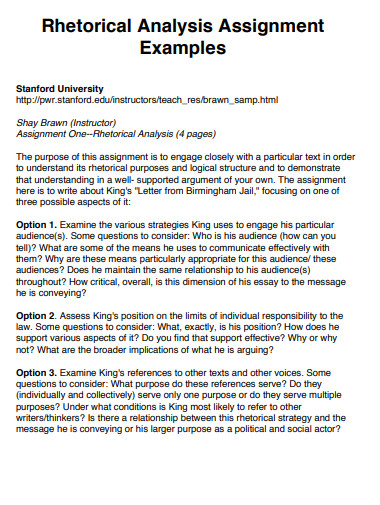Rhetoric refers to the study of how speakers and writers persuade or influences their readers and audiences. In an analysis essay, you break down pieces of composition which include advertisements, speech outlines, and cartoons into sections and deliver an explanation of how each of these sections works to convince, entertain, or inform an individual. It enables you to discover how effective used strategies are, how the argument has been established, and provide examples from a given text.
10+ Rhetorical Analysis Samples
1. Rhetorical Analysis
2. Rhetorical Analysis Process
3. Rhetorical Analysis Essay
4. Rhetorical Analysis Thesis Statements
5. Brief Guide to Rhetorical Analysis
6. Rhetorical Analysis Checklist
7. Rhetorical Analysis for Professional Document
8. Rhetorical Analysis Worksheet
9. Basic Rhetorical Analysis
10. Musical Rhetorical Analysis
11. Rhetorical Analysis Assignment
What Is a Rhetorical Analysis?
A rhetorical analysis is an essay writing sample that considers all elements of a rhetorical situation, including the audience, medium, objectives, and context, where a communication are generated and delivered to create an argument about the mentioned communication. An effective rhetorical analysis not only describes and analyzes a composition or text but also evaluates it. This analysis evaluates the intention of the writer and the technique they use instead of examining the content.
How to Compose a Rhetorical Analysis
A rhetorical analysis is written to explore how a writer or rhetorician can create their work. This analysis can be created to evaluate any text, visual argument, or copy that intends to persuade a reader or audience. The rhetorical analysis aims to evaluate the goal and purpose of the writer as well as their strategies to create an argument. It does not agree or disagree with the writer’s stand but describes how they communicate and present their argument as well as to determine how effective it was.
Step 1: Collect Useful Information
Determine the elements of the work and create your analysis plan. You can use the SOAPSTone which is a literary analysis that stands for Speaker, Occasion, Audience, Purpose, Subject, and Tone.
Step 2: Evaluate the Persuasive Strategies
Writers use persuasive strategies or appeals to convince the audience or readers to react to their work. There are three types of appeals which are Ethos which establishes the credibility of the writer, Logos which refers to logical appeals like evidence and data, and Pathos which was designed to appeal to the emotions of the readers or audiences.
Step 3: Establish your Analysis
To determine the purpose or reason for the writer’s choices, ask yourself a set of questions about the information you have gathered during your data collection. It will also help you determine how well the information supports the writer’s opinion and arguments.
Step 4: Write Your Content
Like other essay format templates or essay outline templates, a rhetorical analysis template also includes the basic essay components such as the introduction, body, and conclusion. It also includes a thesis statement which is a single sentence at the end of your introduction. The thesis statement summarizes your argument about the reasons of the writer.
FAQs
What are the tips for writing a rhetorical analysis?
When writing a rhetorical analysis, make sure you are well prepared and choose a topic that you are interested in, write in the third-person point of view instead of the first person, use strong verbs that imply analysis, create a strong concluding statement, and do not forget to cite your list of references.
What is the purpose of a rhetorical analysis?
A rhetorical analysis aims to deliver a clear and concise explanation of the effect that a piece of writing has on its reader or audience, how effective it is, and the methods and appeals they use to achieve its purpose or goals.
What are the key concepts in rhetoric?
Rhetoric has a few concepts which include the appeals or how the writer persuades their readers, the text and context, and the claims supports, and warrants.
A rhetorical analysis is an essay format that explores the writer’s goals, the techniques or tools they used, and how effective those techniques are. Writing a rhetorical analysis is not about agreeing or disagreeing with the author’s argument but about discussing how the writer makes the argument and determining whether their approach is successful or not. Like other types of essays, a rhetorical analysis is also written with an essay introduction, body paragraphs, and a conclusion.
Related Posts
FREE 10+ Failure Mode and Effects Analysis Samples in PDF
FREE 10+ Make or Buy Analysis Samples in PDF
FREE 10+ Fishbone Root Cause Analysis Samples in PDF
FREE 11+ Cost Volume Profit Analysis Samples & Templates in PDF | MS Word
FREE 6+ Corporate Portfolio Analysis Samples in PDF
FREE 10+ Fault Tree Analysis Samples in PDF
FREE 10+ Comp Analysis Samples in PDF
FREE 10+ Fishbone Analysis Samples in PDF
FREE 10+ Individual Swot Analysis Samples in PDF
FREE 10+ 5 Year Analysis Samples in PDF
FREE 10+ Benefit Costs Analysis Samples in PDF
FREE 10+ Job Hazard Analysis Samples in PDF
FREE 10+ Primary Source Analysis Samples in PDF
FREE 10+ Critical Path Analysis Samples in PDF
FREE 10+ Competition Analysis Samples in PDF

